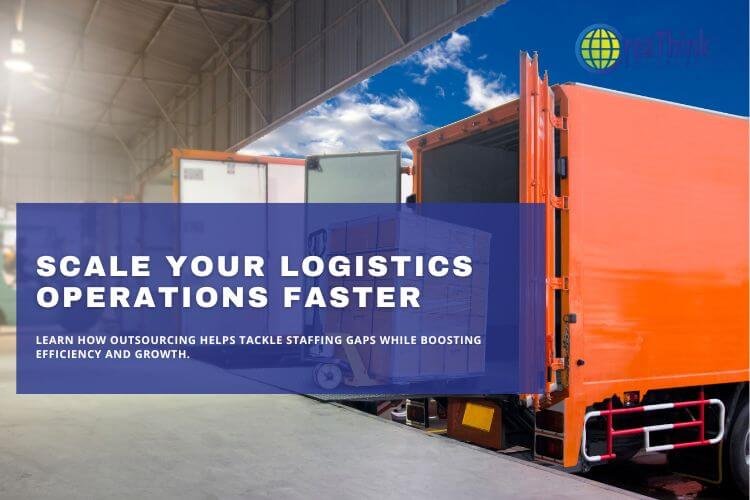The U.S. logistics industry is the backbone of supply chains, yet it faces relentless staffing challenges. From the stress of unanswered customer calls to the overwhelming turnover rate among dispatchers, many trucking companies struggle to keep pace. Back-office teams are also under pressure—managing mountains of paperwork, invoices, and compliance documents often means sacrificing speed and accuracy.
This article addresses a pressing question: What are the biggest staffing challenges in U.S. logistics, and how can business process outsourcing in the Philippines provide a direct solution?
By exploring real-world pain points and highlighting how logistics BPO services work, you’ll see why outsourcing logistics has become a strategic move for freight companies and supply chain leaders alike.
Common Logistics Pain Points
The logistics sector is people-intensive, requiring coordination across drivers, customers, and compliance officers. Unfortunately, U.S. companies continue to face significant bottlenecks:
1. Customer Service Chaos
Customers demand instant answers—shipment updates, delivery ETAs, or resolutions to last-minute changes. Yet many carriers lose opportunities because phones go unanswered during peak hours. A single missed call can mean lost revenue and frustrated clients.
2. Dispatch Headaches
Dispatchers juggle multiple responsibilities: assigning loads, tracking routes, and managing real-time communication with drivers. High turnover in this role creates knowledge gaps and inconsistent service.
3. Back-Office Burden
From data entry to billing and compliance reports, the paperwork piles up. Manual processes lead to delays, errors, and frustrated accounting teams who are always behind schedule.
In short, staffing shortages compound inefficiencies across the entire logistics chain. This is where outsourcing logistics tasks offers relief.
How a Logistics BPO Transforms Your Operations
Outsourcing logistics doesn’t just reduce costs—it solves staffing shortages while improving performance. Let’s break it down:
A. Fixing Customer Service Overload
Logistics BPO services provide dedicated call center teams trained to handle shipment inquiries, order tracking, and issue resolution. With 24/7 support, customers no longer wait for callbacks. This not only improves satisfaction but also builds long-term loyalty.
B. Streamlining Dispatch and Fleet Management
Through supply chain outsourcing, dispatch tasks can be managed offshore. Skilled BPO agents use industry-specific software to assign loads, update driver logs, and monitor GPS tracking. With a reliable support team, U.S. carriers reduce dispatcher burnout and ensure smoother fleet operations.
C. Eliminating Back-Office Bottlenecks
Freight and logistics outsourcing covers critical tasks like:
- Data entry and document verification
- Invoice management and payment processing
- Compliance reporting and audit preparation
The result? U.S. teams gain time to focus on revenue-generating activities while offshore experts handle repetitive but essential processes.
Why the Philippines is the Go-To BPO Partner

The Philippines has become the global leader for business process outsourcing, especially for logistics companies. Here’s why:
- Strong English proficiency – Clear communication ensures smooth collaboration with U.S. carriers.
- Service-oriented culture – Filipino professionals are known for patience, empathy, and professionalism.
- Industry expertise – Many BPO firms in the Philippines specialize in logistics BPO services, offering experience with dispatch software, CRM tools, and compliance systems.
- Time zone advantage – 24/7 operations with overlapping shifts make around-the-clock coverage possible.
- Cost efficiency – Outsourcing reduces overhead while maintaining quality.
Quick Comparison: In-House vs. Philippine BPO
| Task | In-House U.S. Team | Philippine Logistics BPO Team |
| Customer service availability | 9–5 with overtime costs | 24/7 coverage at lower rates |
| Dispatch workload | High turnover, training gaps | Experienced agents with specialized tools |
| Back-office tasks | Manual, error-prone | Streamlined, automated support |
| Cost per employee | Higher salaries + benefits | Reduced labor costs, no overhead |
Addressing Common Questions
- What are the biggest staffing challenges in the U.S. logistics industry?
They include driver shortages, dispatcher turnover, rising customer expectations, and back-office inefficiencies. Together, these strains operational performance and customer satisfaction. - How can outsourcing help solve logistics staffing challenges?
By shifting non-core but critical tasks—such as customer support, dispatch, and paperwork—to specialized offshore teams, logistics firms maintain efficiency without overburdening in-house staff.
Partner with CreaThink Solutions for Your Logistics Needs
Outsourcing is no longer just about saving costs—it’s about strategic growth. With freight and logistics outsourcing, you can:
- Improve customer retention through reliable support
- Reduce dispatch errors and delays
- Accelerate back-office processing for smoother cash flow
At CreaThink Solutions, we offer BPO services for logistics companies that are designed to match the real challenges of U.S. carriers and supply chain operators. Our teams combine industry expertise with the scalability you need to stay competitive.
The bottom line: Business process outsourcing in the Philippines empowers U.S. logistics companies to overcome staffing shortages while boosting operational efficiency.
Ready to solve your trucking company’s biggest pain points? Contact us today and transform your logistics operations into a driver of growth. Email us at inquiry@creathink-solutions.com or connect with us on Facebook, YouTube, and LinkedIn pages







